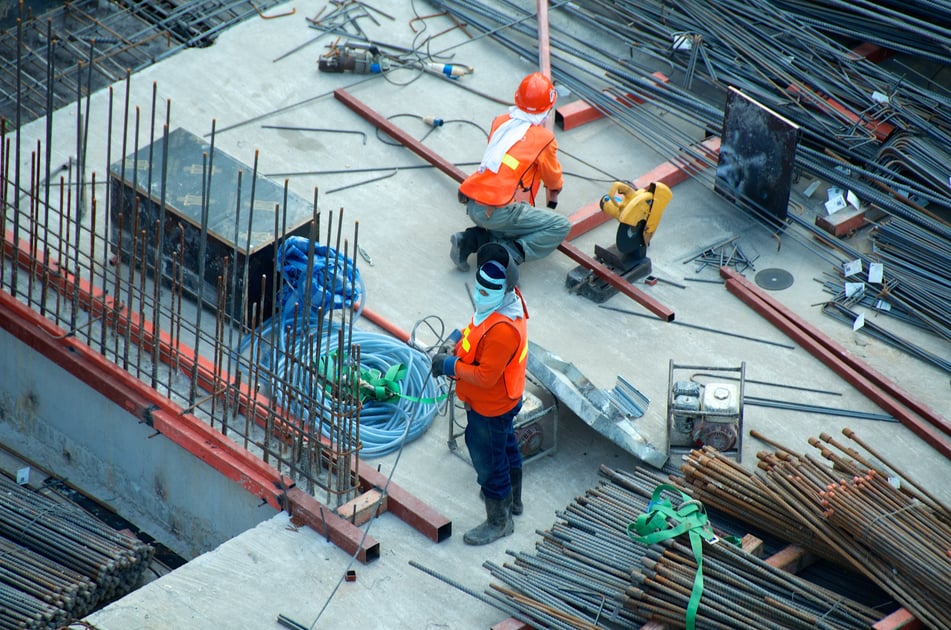CLIENT NOTICES | Please visit www.spli.com/clientnotices for updated information regarding FLORIDA E-VERIFY REQUIREMENTS, ERC CLAIMS, and NO TAX ON TIPS OR OT.
What You Need to Know about Construction Workers Comp Insurance Rates and Coverage Programs
February 23, 2023

As a construction company, workers’ comp is not only necessary but also required in most states. And what happens if your construction business doesn’t get workers’ compensation insurance? Plenty!
What Is Workers Compensation Insurance Coverage and Why Is It Important?
Workers’ compensation insurance for small businesses is extremely important, especially for those in the construction business. This is because it pays for significant bills that could ruin any construction company that doesn’t have it.
Commercial workers' compensation has many benefits. It will pay for medical and recovery costs, ambulance transportation, an injured employee’s lost wages, temporary or permanent disability benefits, and even funeral costs and death benefits for a deceased employee’s family.
Workers' compensation insurance can also pay for legal expenses when an employee files a covered workers' compensation claim. Additionally, it ensures your business is complying with all applicable workers’ compensation laws.
What Happens If Your Construction Business Doesn’t Get Workers’ Compensation Insurance?
If your business doesn’t get workers’ compensation insurance, you could face severe penalties including fines, and monetary penalties, and you might even be forced to close your business until you do get the proper insurance.
What Construction Workers Comp Insurance Coverage Is Required for a Business?
Whether or not your business is required to have workers' compensation insurance will depend on your state. All states except Texas mandate that companies have workers' compensation coverage for their employees, and that applies even if you are a sole proprietor or are self-employed and don’t have any employees. However, each state will have varying degrees of what is required. Therefore, you should check with your state to find out what is required so you are compliant with your state’s laws and avoid incurring any fines.
What Are the Construction Workers Comp Codes?
There is a set of industry-specific workers' compensation classification codes and they are different for each state. The National Council on Compensation Insurance (NCCI) is an insurance industry standard most used to determine the risk level of each job and company. High-risk jobs, like those in the construction industry, generally carry higher rates than lower-risk jobs, like desk jobs, for example. So the NCCI assigns every job a class code that depends on how risky that job is.
How Much Is Workers' Comp Insurance for Construction?
Construction workers comp insurance rates vary from state to state. However, on average, employers pay around $1 per $100 of payroll. Additionally, these rates vary based on several factors such as:
- Location
- Claims history
- Payroll
- Number of employees
- Risk factors
- Coverage limits
Although the cost of construction workers comp insurance varies from state to state, here is a quick formula to estimate your workers’ comp premiums.
Class Code Rate x Payroll ÷ $100 x Experience Modifier = Premium
This baseline formula is what most insurers use to calculate workers' compensation premiums. However, since this is just a baseline formula, expect some variance.
What Work-Related Injuries Are Not Covered by Workers’ Compensation?
While workers' comp covers almost all work-related injuries, it doesn’t cover everything. Here is a list of what a workers’ comp doesn’t cover.
- Some acts of God.
- One-time illnesses like headaches or the flu.
- Pre-existing conditions that an employee had before being hired or prior to performing any given job.
- Intentional injury to oneself.
- Injuries that occur because an employee is intoxicated or under the influence of illegal drugs.
- An employee who suffers an unrelated heart attack on the job.
- Injuries sustained while the employee was participating in an off-the-clock recreational activity.
- An injury sustained while the employee is committing a serious crime.
- Any injuries suffered off-the-clock.
- An injury that results from employee horseplay.
- Any injury that occurs because the employee is violating a company policy
- Injuries that are a result of mental trauma only.
Important Things to Note about Workers’ Compensation
Please note that construction workers' comp insurance does not cover pain and suffering.
It’s also important to note that workers’ compensation insurance covers most work-related injuries that happen on the job site, but it also covers work-related injuries that occur off the job site. For example, work-related injuries that might occur at a job conference, trade show, on a business trip, or anywhere else you might be working, regardless of the location.
Additionally, when an employee is collecting workers’ compensation benefits, they can’t sue their employer for a workplace injury.
Hire an Expert PEO Service to Handle Your Workers’ Comp Needs
A professional employer organization (PEO) service is a company that offers full-service human resource outsourcing. A PEO can perform various human resource tasks for you, including your workers’ compensation needs and more.
What’s Next?
If you would like a quote for expert PEO services, please Contact SouthEast Personnel Leasing, Inc. today. We offer construction workers' comp insurance coverage and payroll administration services. Let us show you just how easy and cost-effective using a PEO service can be.


